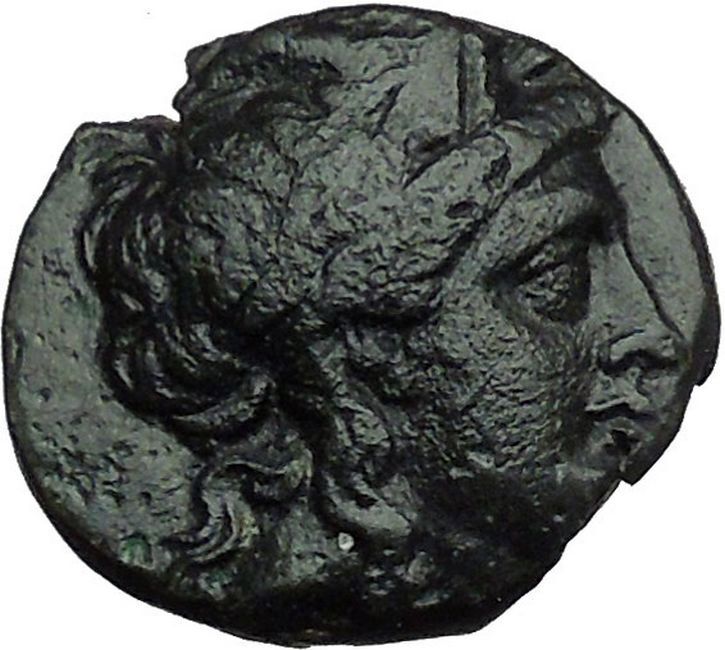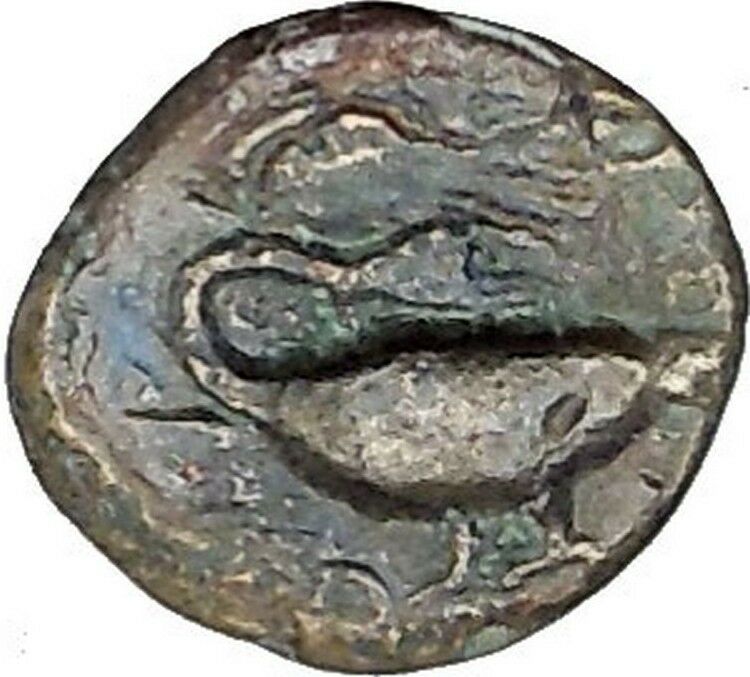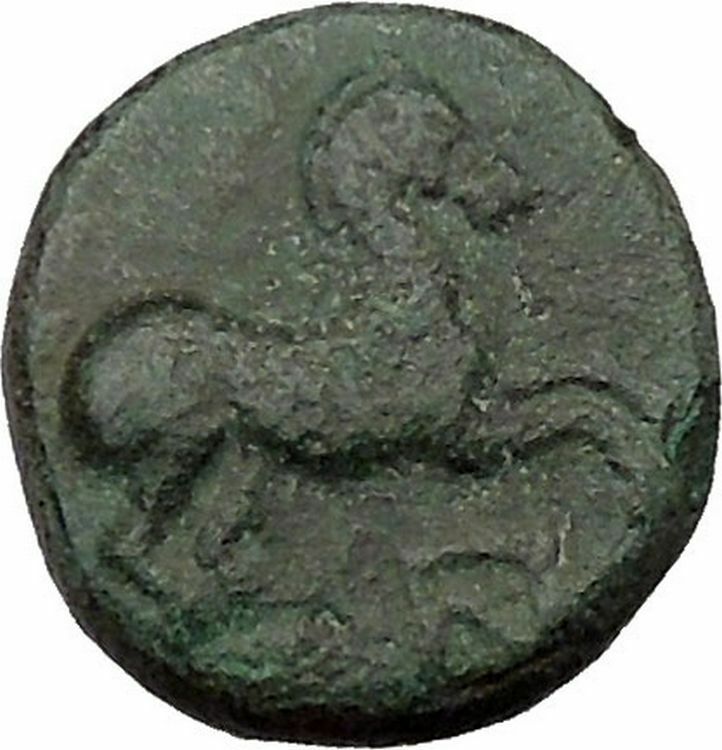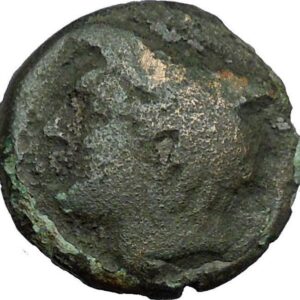|
Biblical Jerusalem under Roman Administration
Coponius – prefect under Augustus 6 – 9 A.D.
Bronze Prutah 15mm (1.90 grams) Jerusalem mint, struck 5/6 A.D.
Reference: Hendin 1328 (5th Edition)
KAICAPOC (of Caesar), ear of grain curved to right.
LΛϛ (year 36 = 5/6 A.D.) in fields; eight-branched palm tree bearing two bunches of dates.
You are bidding on the exact item pictured, provided with a Certificate of Authenticity and Lifetime Guarantee of Authenticity.
Starting with the Jewish Kings, most coins were minted at the Jerusalem mint. The Hosmoneon Dynasty coinage begins with John Hyrcanus I (135-104 B.C.) followed by Judah Aristobulus (104 B.C.), then Alexander Jannaeus (104-76 B.C.). The Herodian Dynasty came next with Herod I (the Great) (40-4 B.C.), followed by Herod Archelaus (4 B.C. – 6 A.D.), Herod Antipas (4 B.C. – 39 A.D.), Herod Philip and Herod Agrippa I (41-44 A.D.).
Roman Procurator coinage was issued under procurators and prefects of the province of Judaea which minted coins with names of contemporary emperors between circa 6 – 66 A.D. They minted only one denomination and size, the bronze Prutah. Not all of the procurators and prefects issued coinage in the province of Judaea under the Romans. Those that did issue coins were Coponius (6-9 A.D.) (under the Roman emperor Augustus, 27 B.C.-14A.D.), Marcus Ambibulus (9-12 A.D.), Valerius Gratus (15-18/26 A.D.) (time of Roman emperor Tiberius 14-37 A.D.), Pontius Pilate (26-36 A.D.), Antonius Felix (52-60 A.D.) (under Roman emperor Claudius 41-54 A.D.), and Porcius Festus (59-62 A.D.) (under emperor Nero 54-68 A.D.). The last three procurators were Lucceius Albinus, Gessius Florus and Marcus Antonius Julianus. They did not issue any coins since the First Jewish-Roman War was brewing during emperor Nero’s reign and the leaders of the revolt started issuing their own coins for the period known as the Jewish War (67-70 A.D.).
After the conquest of Jerusalem under Vespasian and Titus, this period of coinage ended and Romans commemorated the victories over Jerusalem and the surrounding area with Judaea Capta coinage.
Prutah (Hebrew: פרוטה) is a word borrowed from the Mishnah and the Talmud, in which it means “a coin of smaller value”. The word was probably derived originally from an Aramaic word with the same meaning.
The prutah was an ancient copper Jewish coin with low value. A loaf of bread in ancient times was worth about 10 prutot (plural of prutah). One prutah was also worth two lepta (singular lepton), which was the smallest denomination minted by the Hasmonean and Herodian Dynasty kings.
Prutot were also minted by the Roman Procurators of the Province of Judea, and later were minted by the Jews during the First Jewish Revolt (sometimes called ‘Masada coins’).
Coponius was the first governor (Prefect) of Iudaea province, from 6-9 A.D. Coponius was the first Roman Prefect of Judaea, being appointed in 6 AD when Herod Archelaus, the son of Herod the Great, was deposed and banished to Gaul by Augustus. He was, like the Prefects who succeeded him, of knightly rank, and “had the power of life and death”.
Coponius depicted the palm tree bearing two bunches of dates on his coinage, which previously had appeared only on extremely rare coins of Herod Antipas. The palm tree design was later used to represent Judaea on coins issued by the Jews during the First and Second Revolts, as well as later Roman-issued Judaean-related pieces. The obverse of Coponius’s coins show an ear of barley. The representation of palm trees and barley was done out of sensitivity to Jewish belief not to depict a living creature, and especially not a human being, on their coinage; hence, there is no portrait of the Emperor Augustus on these coins. However, the inscriptions on the coins clearly proclaim that Judaea was occupied by Imperial Rome; hence, the Greek letters surrounding the barley read: [K]aisa-ros [“of Caesar”] with the date, also in Greek letters, under the palm.
During his administration occurred the revolt of Judas the Galilean, the cause of which was not so much the personality of Coponius as the introduction of Roman soldiers. Owing to the reconstruction of the province of Judea then in progress, the census was being taken by Quirinius, which was a further cause of offence. Coponius was recalled to Rome, and replaced by Marcus Ambibulus. Probably it is on account of this occurrence that one door of the Temple bore the name of “door of Coponius”. Regarding the personal attitude of Coponius toward the Jews nothing definite is known.
 Prefect (from the Latin praefectus, substantive adjectival form of praeficere: “put in front”, i.e., in charge) is a magisterial title of varying definition, but which, basically, refers to the leader of an administrative area. Prefect (from the Latin praefectus, substantive adjectival form of praeficere: “put in front”, i.e., in charge) is a magisterial title of varying definition, but which, basically, refers to the leader of an administrative area.
A prefect’s office, department, or area of control is called a prefecture, but in various post-Roman empire cases there is a prefect without a prefecture or vice versa. The words “prefect” and “prefecture” are also used, more or less conventionally, to render analogous words in other languages, especially Romance languages.
Praefectus, often with a further qualification, was the formal title of many, fairly low to high-ranking, military or civil officials in the Roman Empire, whose authority was not embodied in their person (as it was with elected Magistrates) but conferred by delegation from a higher authority. They did have some authority in their prefecture such as controlling prisons and in civil administration.
The Roman province of Judea (Hebrew: יהודה, Standard Yehuda Tiberian Yehûḏāh; Arabic: يهودا; Greek: Ἰουδαία Ioudaia; Latin: Iūdaea), sometimes spelled in its original Latin forms of Iudæa or Iudaea to distinguish it from the geographical region of Judea, incorporated the regions of Judea, Samaria and Idumea, and extended over parts of the former regions of the Hasmonean and Herodian kingdoms of Israel. It was named after Herod Archelaus’s Tetrarchy of Judea, but the Roman province encompassed a much larger territory. The name “Judea” was derived from the Kingdom of Judah of the 6th century BCE.
The province of Judea was the scene of unrest at its founding in 6 CE during the Census of Quirinius and several wars were fought in its history, known as the Jewish-Roman Wars. The Temple of Jerusalem was destroyed by the Romans in 70 CE as part of the Great Jewish Revolt, resulting in the institution of the Fiscus Judaicus, and after Bar Kokhba’s revolt (132-135), the Roman Emperor Hadrian changed the name of the province to Syria Palaestina and Jerusalem to Aelia Capitolina, which certain scholars conclude was an attempt to remove the relationship of the Jewish people to the region.
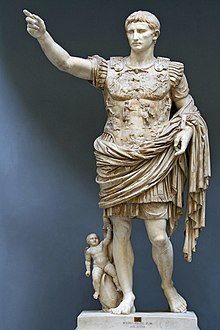 Augustus – Roman Emperor: 27 B.C. – 14 A.D. Augustus – Roman Emperor: 27 B.C. – 14 A.D.
| As Octavian: Member of Second Triumvirite, 43-33 B.C. | As Octavian, Imperator, 31-27 B.C. | As Augustus 27 B.C. – 14 A.D. |
| Grand-nephew and adopted son of Julius Caesar | Husband of Scribonia and Livia | Father of Julia (by Scribonia) | Brother of Octavia | Brother-in-law of Mark Antony | Father-in-law of Marcellus, Agrippa and Tiberius | Adoptive father of Tiberius and Nero Claudius Drusus | Uncle of Antonia | Grand-uncle of Germanicus, Claudius and Livilla | Grandfather of Gaius Caesar, Lucius Caesar, Agrippa Postumus, Julia the Younger and Agrippina Senior | Great-grandfather of Nero Caesar, Drusus Caesar, Caligula, Agrippina Junior, Drusilla and Julia Livilla | Great-great-grandfather of Nero |
Augustus (Latin: Imperātor Caesar Dīvī Fīlius Augustus; 23 September 63 BC – 19 August 14 AD) was the founder of the Roman Empire and its first Emperor, ruling from 27 BC until his death in AD 14.
He was born Gaius Octavius into an old and wealthy equestrian branch of the plebeian Octavii family. His maternal great-uncle Julius Caesar was assassinated in 44 BC, and Octavius was named in Caesar’s will as his adopted son and heir, then known as Octavianus (Anglicized as Octavian). He, Mark Antony, and Marcus Lepidus formed the Second Triumvirate to defeat the assassins of Caesar. Following their victory at Philippi, the Triumvirate divided the Roman Republic among themselves and ruled as military dictators. The Triumvirate was eventually torn apart under the competing ambitions of its members. Lepidus was driven into exile and stripped of his position, and Antony committed suicide following his defeat at the Battle of Actium by Octavian in 31 BC.
After the demise of the Second Triumvirate, Augustus restored the outward façade of the free Republic, with governmental power vested in the Roman Senate, the executive magistrates, and the legislative assemblies. In reality, however, he retained his autocratic power over the Republic as a military dictator. By law, Augustus held a collection of powers granted to him for life by the Senate, including supreme military command, and those of tribune and censor. It took several years for Augustus to develop the framework within which a formally republican state could be led under his sole rule. He rejected monarchical titles, and instead called himself Princeps Civitatis (“First Citizen of the State”). The resulting constitutional framework became known as the Principate, the first phase of the Roman Empire.
The reign of Augustus initiated an era of relative peace known as the Pax Romana (The Roman Peace). The Roman world was largely free from large-scale conflict for more than two centuries, despite continuous wars of imperial expansion on the Empire’s frontiers and one year-long civil war over the imperial succession. Augustus dramatically enlarged the Empire, annexing Egypt, Dalmatia, Pannonia, Noricum, and Raetia; expanding possessions in Africa; expanding into Germania; and completing the conquest of Hispania.
Beyond the frontiers, he secured the Empire with a buffer region of client states and made peace with the Parthian Empire through diplomacy. He reformed the Roman system of taxation, developed networks of roads with an official courier system, established a standing army, established the Praetorian Guard, created official police and fire-fighting services for Rome, and rebuilt much of the city during his reign.
Augustus died in AD 14 at the age of 75. He may have died from natural causes, although there were unconfirmed rumors that his wife Livia poisoned him. He was succeeded as Emperor by his adopted son (also stepson and former son-in-law) Tiberius.
|





 Prefect (from the Latin praefectus, substantive adjectival form of praeficere: “put in front”, i.e., in charge) is a magisterial title of varying definition, but which, basically, refers to the leader of an administrative area.
Prefect (from the Latin praefectus, substantive adjectival form of praeficere: “put in front”, i.e., in charge) is a magisterial title of varying definition, but which, basically, refers to the leader of an administrative area. Augustus – Roman Emperor: 27 B.C. – 14 A.D.
Augustus – Roman Emperor: 27 B.C. – 14 A.D.

